Seattle Mariners legend Ruppert Jones discusses career, today’s game

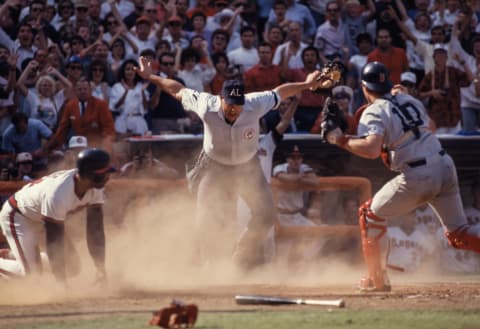
Seattle Mariners legend Ruppert Jones is 2x All-Star and World Champion, who played from 1976 until 1987 for a number of teams. I had the opportunity to speak with Ruppert Jones about how the game has changed and to share some of his fondest memories from his playing days.
Marcus Guy: Thank you for taking the time, Mr. Ruppert Jones.
Ruppert Jones: Oh, it’s my pleasure, and please, call me Rupe.
MG: Much has changed since you’ve played, but the structure has remained the same. You have nine innings, you’ve have three outs and three strikes. But the strategy has changed. The way the bullpen is used. The number of home runs and strikeouts. How many pitches do pitchers throw?
What do you miss most from the way baseball used to be played?
Rupe: Action. Our game needs action. A hit-and-run is action. Stealing a base is action; nobody puts pressure on the defense anymore. The ball isn’t put in play. I just put it on all aspects of the game. There’s no pressure on the defense.
MG: To your point, the lack of hustle in today’s game also relaxes the pressure on the fielders.
Rupe: That’s the whole thing about running hard all the time, man! The infielders know they’ve got to get rid of the ball, so you put pressure on him. If a guy knows he can catch the ball, (and the runner is not hustling), he will look at it and throw it across the diamond- that’s too easy. If he knows you’re running hard, then he’s got to rush it, and can’t be holding the ball too long. Consequently, you raise the chances that he will not make a good throw.
MG: Earlier this year, White Sox shortstop Tim Anderson hit a home run off of actually your former team the Kansas City Royals. After he hit the Home Run, he did a grandiose bat-flip and he enjoyed himself. The Royals were not having it, so the next at-bat, he got plunked; the benches cleared and suspensions were handed out. What are your thoughts on styling a home run or hitting a batter in response to such an act?
Rupe: This game is accepting of that now. They call that entertainment. “Entertainment at whose expense?” is what you have got to ask yourself. You’re only looking at one side of it, and people don’t see the other side. If I’m a pitcher- I make my living pitching. If you hit a home run off me, I don’t like that to begin with, and then when you flip your bat- that just adds fuel to the fire.
MG: Baseball has always been a very classy game and its focus on class is more so than any of the other major sports. I feel that that is one of the reasons why there is such a protocol in baseball. In the old days, would people show you up like that?
Rupe: Take Nolan Ryan, for example- as a matter of fact, there are a whole lot of guys, not just Nolan that would put you in your place. Sometimes there were teams, teams that didn’t like you. You had to play these guys on numerous occasions. It’s not like you had two games against them. No, you got to see them numerous times (throughout the season), and showing them up creates bad blood.
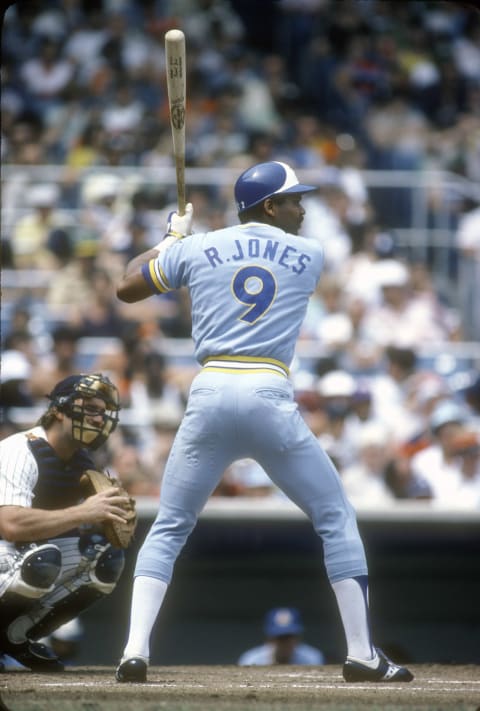
Interview with Ruppert Jones
Marcus Guy: You were a part of a historic moment or a potentially historic moment when you homered off Dennis Eckersley. (Eckersley was two outs shy of tying Cy Young‘s record of consecutive hitless innings.) Did you go up there hoping to hit a homerun? Did you have that that attitude or you were just going to get a hit?
Ruppert Jones: Well, no team likes to be no-hit. I’m not sure how they feel today. But no team likes to be no-hitted. So consequently, when you go to the plate, you’re thinking about not letting this guy no-hit us. I was very fortunate. Dennis was a great pitcher. He’s in the hall of fame. That’s all you need to know. Dennis was a really great pitcher.
MG: You’ve played on a number of teams with many Hall of Fame teammates, Reggie Jackson, Goose Gossage, I believe were your teammates…
Rupe: …Rod Carew, Don Sutton
MG: His (Don Sutton) numbers are unbelievable! He was on your team when he was in his 40’s!
Rupe: Well, one of the things that tripped me out is that it took so long for him to get into the Hall of Fame. To get the numbers that he had, you have to play a long time. So, you can’t penalize a man for longevity because that’s a good thing! He was durable. He pitched for a long time. He had over 3500 strikeouts and over 300 wins. What are the criteria? How many guys are not in the Hall of Fame that have 3,500 strikeouts and 300 wins?
MG: No one that has those numbers is not in the Hall of Fame besides Roger Clemens. CC Sabathia this year got his 3,000th strikeout and his 250th win and he’s nearly a lock for the Hall of Fame.
Rupe: He (Sabathia) has got 60/70 wins less that Don Sutton! He’s got less strikeouts than Don Sutton too!
MG: Another great pitcher you played with is Tommy John. He played when he was 46 years old! He had the famous Tommy John surgery, but he was pitching into his mid-40’s! It is unbelievable the age that these guys were pitching at.
Rupe: Tommy John was an incredible pitcher. He had 288 wins and he lost 231 games, with a 3.34 ERA. He was truly a great pitcher.
MG: Wow, those are Hall of Fame numbers right there. He is known for the famed Tommy John surgery, but people don’t realize how great of a pitcher he really was.
Rupe: That’s right. We had an amazing pitching staff back than; Tommy John, Ron Guidry, Goose Gossage, Rudy May. Man, Rudy May, he did everything. He spot-started. He pitched in long relief; He did everything.
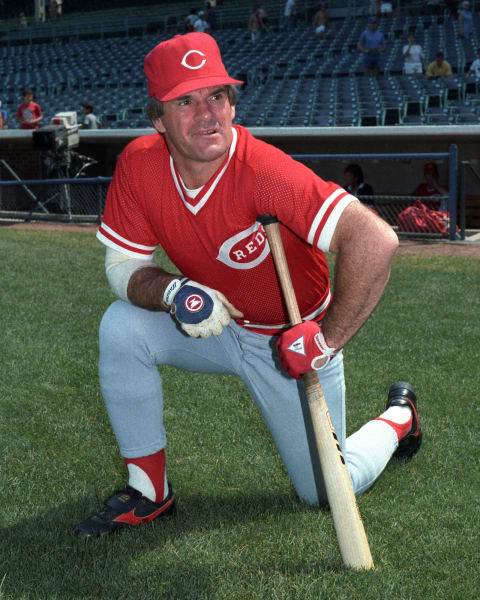
Interview with Ruppert Jones
Marcus Guy: We just got past the All-Star break and being a two-time All-Star, I imagine that you met some people, some players at the All-Star game that you were like “Wow. I am actually meeting this man.” To whom was that most applicable?
Ruppert Jones: I met Pete Rose at the hotel. We caught the bus together and it was my first time in ’77- And I was mesmerized, because I’ve seen Pete Rose play in the 60’s when I was a kid, and I always admired him and always respected him. So when I saw him up close and personal, I had never met him because I had been in the American League (and this was pre-interleague play), it was overwhelming.
MG: What are your thoughts about the National League having a Designated Hitter?
Rupe: Do you pay to see the pitcher hit?
MG: No, I don’t.
Rupe: Well, the National League has their own reasons why they don’t want a DH. But I think a DH is a good way to keep the pitchers off the base paths and away from the plate. They might hurt themselves. There are just so many ways you can lose a good pitcher by him getting a chance to hit and to run. Now, at one time in baseball, that was the game. But they want to change the game and they’re changing all these rules and regulations, already, so why not change the DH rule too.
MG: I think it (the Universal DH) is going to happen sooner or later. Bryce Harper who just signed a major deal with the Phillies last season was one of the worst fielding outfielders in the game. His contract is going to be up when he’s 38 years old. Can you imagine a 38-year-old Bryce Harper having to play the field? It’s not good for baseball. I think that both leagues need the DH.
You grew up watching baseball. Who is the best player you’ve ever seen play?
Rupe: Willie Mays. He’s my favorite? I saw him play. I lived in Texas and then I moved to California. I watched him when I was in Texas too. When I was in Texas as a little boy, when they came on television, I watched him every chance I got. In the summer of ’67, when I moved to Berkeley California, I was 12 years old. The following summer, when I was 13 years old, I caught the bus from Berkeley to Candlestick Park. I had to transfer a few times, but I caught the bus from Berkeley to Candlestick Park all by myself, just to see Willie Mays play.
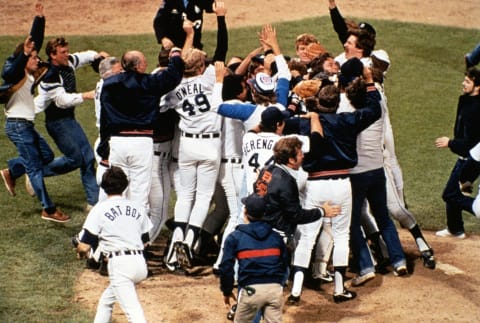
Interview with Ruppert Jones
Marcus Guy: You won a World Series with the Tigers, defeating your former team, the San Diego Padres in 1984. Managing the team back then was the legendary Sparky Anderson. Can you share a story about Sparky?
Ruppert Jones: Of course! As a matter of fact, we just had our 35th Anniversary two weeks ago and they gave us Sparky bobbleheads for a gift. Sparky was a smart manager. He knew how to push his players. He knew which buttons to push. My fondest story of Sparky was in game five of the World Series when Dick Williams (manager of the Padres) brought in Goose Gossage to pitch when Kirk (Gibson) came to the plate. Dick wanted Gossage to walk Gibson. Goose said no, “I’m not walking him”. So, Dick came out of the dugout. And he asked nicely “Goose. You don’t want to walk him?” Goose responded, “no, I’m going to pitch to him”. Sparky yelled out the dugout. “Hey, Gibby. He doesn’t want to walk you. Hey, Gibby. He doesn’t want to walk you.”, When he would do that, it would fire Gibson up because he took it as a challenge. Gibby went on to hit a three-run homer and we won game five.
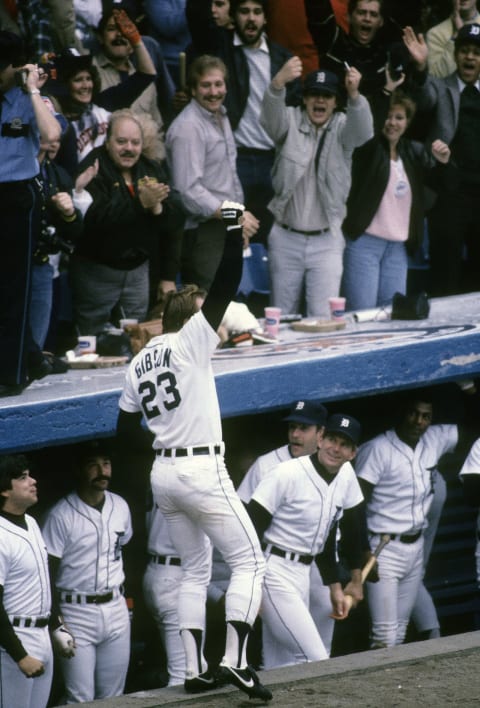
MG: The MLB’s umpires have been receiving a lot of criticism lately for bad judgment calls on balls and strikes, and some folks are calling for electronic umpires. What do you think?
Rupe: They (those who want the electronic umpires) want to take all the personality out of the game. I think they should remove the boxes (from the live television stream which demonstrates a clear ‘box’ which shows the viewer if the pitch should have or should not have been called a strike/ball) and not have the boxes up; because you are putting pressure on the umpires. The game has a human element. If you take the human element out, you’re stripping the game of what it is. The human element is crucial to the game of baseball.
More from Call to the Pen
- Philadelphia Phillies, ready for a stretch run, bomb St. Louis Cardinals
- Philadelphia Phillies: The 4 players on the franchise’s Mount Rushmore
- Boston Red Sox fans should be upset over Mookie Betts’ comment
- Analyzing the Boston Red Sox trade for Dave Henderson and Spike Owen
- 2023 MLB postseason likely to have a strange look without Yankees, Red Sox, Cardinals
MG: You played against Harold Baines. What do you think about him getting into the Hall of Fame?
Rupe: Harold was a hell of a hitter. Harold hurt his knee, and so, he couldn’t play the outfield, and it cut him down a little bit. But Harold could hit, man. Do you know how good Harold Baines was? Harold Baines was still playing when his number retired in Chicago. They retired his number (3) in Chicago and then when he came back, they gave it back to him. Okay? That’s all you need to know about Harold Baines. They retired that man’s uniform while he was still playing. He was with a couple of teams, but then he came back to Chicago to finish up his career, and they gave his number back to him.
MG: You were the first draft pick taken by Seattle. Is that true?
Rupe: I was the first player picked in the expansion draft in 1976. I had made my big league debut with the Royals, but in Seattle, man, I got a chance to play every day. I was 22 years old. Would I want to be a 22-year old sitting on somebody’s bench playing part-time, or do I want to be 22 years old and playing every day? I loved Seattle for the opportunity they gave me. I loved the people of Seattle. I just loved the people in Seattle; and if you go to Seattle, they’ve got a plaque on the wall which contains the names of every All-Star player they have ever had, and my name is the first one on the list. Everybody else is below me. Randy Johnson, Ken Griffey Junior, Alex Rodriguez. All their names are below mine.
MG: You were an All-Star in ’77. Was that Seattle’s first season?
Rupe: Yes, sir.
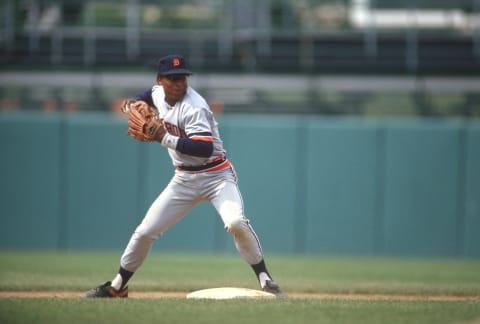
Interview with Ruppert Jones
Marcus Guy: How did it feel winning a Championship, as mentioned, against your former team the Padres?
Ruppert Jones: This is what happened in 1984. I was a free agent, and nobody picked me up. The Pittsburgh Pirates called me to come to Spring Training. This is on Friday. They wanted me on the field on Sunday morning. So, I left California on Saturday. I pulled into the Bradenton complex (home of the Pirates minor league affiliate). I pulled in at about 11 o’clock at night and I was on the field the next day at 9:00. And so, I was a non-rostered player. Non-rostered means I made all the bus trips and I played all the ‘B’ games at nine, ten o’clock in the morning. So, every time the bus went somewhere, I was on it. When we were in Bradenton, I played the ‘B’ game and then after the ‘B’ game, I went over to The Big Field and I played in the regular game in the last two or three innings. Well, in the morning games, I got to be around Willie Stargell and work with Willie Stargell, and that was probably one of the biggest highlights of my career. I had a bunch of them, but that was a big highlight. I got to work with Willie Stargell on a daily basis. And I had a really good spring training. I hit about .360 that spring.
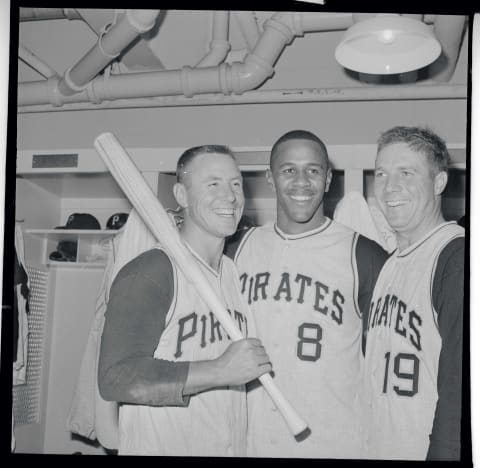
Chuck Tanner (Pirates manager) called me into his office one day and said “Rupert, you’ve done a tremendous job for us, but you haven’t hit any home runs. We want to see you start to hit home runs.” So, the next day, I hit a home run. Two days later, I hit another home run and then we play the game in Bradenton and I pinched hit or I came to hit in the eighth inning, and I hit a home run to straightaway center field. So, I had hit three home runs in like six days. When I was rounding third base, Chuck Tanner was looking at me, and he was smiling. Well, a couple of days later he called me to his office. He said, “I’ve got to do the hardest thing I’ve ever done in baseball.” He said, “We can’t keep you,” He said, “we’ve got some contracts we can’t get rid of and we got to pay these guys, so I can’t keep you.” I said “Chuck. Thank you very much for the opportunity,” and I went home. And I was at home for about three weeks.
The Tigers that year got off to an ungodly start. They came out to shoot (They started the season 35-5). It was in the middle of April, and my agent called me, and he said, “You’ve got an offer to play”. He said, “you’ll never believe it.” I said “What? Who was it?” He said “The Detroit Tigers.” I said, “What do they need me for?” They were off the chart. He said, “well, they want you, and they want you to be in the AAA in two days.” So, I packed up again and headed to Triple-A. I started out slow but then I picked it up. I got really good and I was hitting the ball really well. My contract said that if I’m not in the big league by June, I could opt out and go somewhere else if somebody wanted me.”
I was playing well and AAA. I was playing really well, and the Tigers came to me, I think it was May 28th, and they said, “We know you have a contract that you can opt-out of on June 1st and we would like to bring you up to Detroit, however, we have to do some things in order get you here. It’s going to take us a few days to do it.” So, my agent said, “well you’ve got more offers over here. This team wants you and that team wants you.” I said, “yeah, but that team (the Tigers), they gave me a chance.” So, I said, “tell them I stay in Triple-A with them”. So, I stayed in Triple-A, and then on June 6th, jumped back into the big leagues.
MG: What about that team was so special?
Rupe: I played with some really good guys in Detroit. They were warriors. I really enjoyed playing ball with them. These guys came to play, and so every night when you came to the ballpark, you had to be ready to play, and we played hard every night. Every night was like a war to us. So, when we got to the World Series, the playoffs, we didn’t care. Whoever we played was going to have a hard time. I look back on that team, and as I mentioned, we just celebrated the 35th anniversary, and I’ll admit it, it was like “WOW!” It was like ‘Deja vu all over again’. We had a chance to have dinner together, and we talked, and we got to interact, and amazingly, the team chemistry was still there.
MG: Who was your favorite teammate?
Rupe: Willy Horton. I played with Willy Horton in 1979 when I was in Seattle. Best teammate. A lot of guys will say that; Willie Horton was my favorite teammate.
MG: You still follow baseball, and as an old-school guy- who is your favorite player to watch right now?
Rupe: Mike Trout without a doubt. He plays the game the way it’s supposed to be played. When he hits the ball, infielders and outfielders have got to get rid of the ball because he runs hard and is always looking to take the next base.
Next. BOS: Bogaerts joins Ted Williams in record books. dark
Marcus Guy: Thank you, Rupe, for taking the time to answer a few questions!
Ruppert Jones: It was my pleasure!